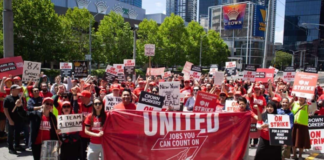Scott Morrison’s contempt for women, workers and the unemployed is on display for all to see.
The sickening culture of sexual assault and callous indifference within the Liberal Party have rocked the government. The response to Liberal staffer Brittany Higgins’ rape showed the appalling sexism and cynical political management that typifies Morrison’s approach.
Higgins says her assault was treated as a political inconvenience and she was told that dropping a police complaint was the price for keeping her job in politics. Morrison’s office was informed yet he claimed to know nothing about what had happened. And even when it came to light he tried to avoid an independent inquiry.
There is now another horrendous rape allegation against a senior Coalition MP in Morrison’s Cabinet.
The Liberals’ sexist culture has been exposed before, with two other former staffers, Chelsey Potter and Dhanya Mani, going public in 2019 with allegations against party colleagues that were never dealt with. Just 23 per cent of federal Liberal MPs are female.
Morrison’s announcement on the permanent rate of JobSeeker also shows he is determined to force the unemployed to live in desperate poverty. The disgraceful decision delivers just $3.57 a day extra for the unemployed, nowhere near enough to make a difference.
The pathetic $25 a week increase actually means that JobSeeker payments drop by $100 a fortnight at the end of March, when the last of the coronavirus supplement is removed.
And if that wasn’t abusive enough, the government has launched a hotline for employers to “dob in” job seekers who refuse a job offer. It was a transparent effort to send the signal that the unemployed are all bludgers who don’t want to work.
Yet as ACOSS noted, “There is only one job available for every nine people looking”.
Scott Morrison’s pathetic justification was that Australia was returning to “more normal” conditions after the pandemic. But there were still 1.54 million people being supported by JobKeeper payments at the end of December, more than double the number of those on the dole.
Many of them are facing unemployment at the end of March when JobKeeper also cuts out—and will be immediately thrown into poverty. Unemployment is not expected to be back where it was before the pandemic until mid-2023.
Labor still moving right
Morrison’s approval ratings are still riding high, but two-party preferred polling has Labor and the LNP 50-50.
But Labor is still moving to the right as it drops policies it took to the 2019 poll and fails to offer any serious opposition to Morrison. Leader Anthony Albanese said he thought the rate of JobSeeker should rise but refused to say by how much, out of concern that might commit Labor to raising the rate itself if it ever wins government.
The same is true over climate change. Morrison now ranks among the worst of the world leaders refusing to take serious action. After spending the last year completely rejecting a target of zero emissions by 2050, he now says, “Our goal is to reach net zero emissions as soon as possible, and preferably by 2050.”
So Albanese’s use of the 2050 target makes Labor’s policy barely distinguishable from Morrison’s and makes Albanese look weaker than ever.
Worse, Labor appears to be incapable of dealing with Morrison’s push for a “gas-fired recovery” from the pandemic, with Albanese trying to have it both ways, saying he supports the role of gas but also wants more renewable energy.
Morrison wants workers to pay for the recovery by delivering more “flexibility” for business with his new industrial relations laws. After it became clear that the changes would not get through the Senate, the government has dropped its plan to allow workplace agreements to undercut minimum standards on pay and conditions.
But it is still pushing the rest of the Bill, including rules that could see workers doing extra shifts without overtime rates and eight-year agreements without the right to strike for newly established greenfield worksites.
Labor and the union movement have rightly opposed the Bill. In his one effort to clearly differentiate himself from the Liberals, Albanese has announced proposed workplaces changes focused on increasing the rights of casual workers. But it will take much more than this to convince workers that Labor has any real alternative to offer.
Mass demonstrations and stopwork rallies called by the unions could galvanise the anger at Morrison’s attacks on workers’ rights and the unemployed. But so far the ACTU have settled for yet another campaign to lobby the Senate.
The rallies on Invasion Day and against refugee hotel detention were good first steps in mobilising seriously again on the streets after COVID restrictions sent much of the left into retreat. Taking to the streets over climate change, workers’ rights and refugee rights can strike back at Morrison and build confidence to fight for the kind of change that is needed.





